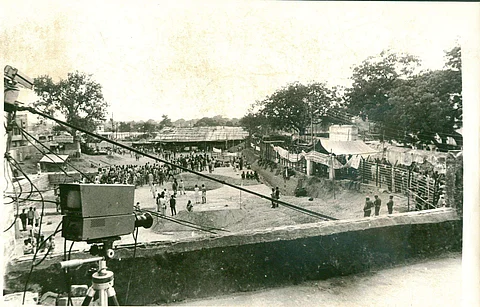

There will be a mandir and it will be on the Ram Janmabhoomi in UP's Ayodhya. The five-member bench of the Supreme Court of India ruled that the disputed site will be given to the Ram Janmabhoomi Nyas and said that it belongs to Ram Lalla Virajman or Lord Ram. The government will build a temple on the birthplace of Lord Ram. The Sunni Waqf Board will be given 5 acre land at any significant area in Ayodhya.
The Central government will form a trust to build a temple within 3 months and they will administer it. A suitable plot of land measuring 5 acres will be handed over to Sunni Waqf Board either by Central Government or State Government. Sunni Wakf Board at liberty to construct a mosque at the allotted land by the Central or state government.
The SC unanimously dismissed the the Shia Waqf Board and also observed that ASI evidence suggest that there was a non Islamic structure but mere presence of a structure does not lay claim to the disputed land. Faith is a mere indicator and a matter of individual belief, they said. They also observed that placing idols inside the inner santum was an act of desecration. Nirmohi Akhara's claim as Shebaits was also dismissed.
The CJI directed allotment of alternate land to the Muslim who were, in the eye of the court, were dispossessed and the mosque was subjected to demolition and desecration.
The Muslims have not brought evidence to show possessory title, there is no evidence to show the offer of Namaz by Muslims to the exclusion of Hindus, said the apex court. Hindus have been able to establish unimpeded possession of outer courtyard, added SC.
One cannot differentiate between one religion and another, said the Supreme Court. Every judge of this court has the task to uphold Constitution, the judges added.
India took 169 years of communal violence and 69 years of land title dispute to reach a final verdict. The Babri Masjid demolition on December 6,1992, that made the issue a political goldmine came much later. Communal violence has been a part of Ayodhya since 1850 when the Babri Masjid was attacked by Hindus.
Since then, local Hindu groups made occasional demands of being handed over the possession of the site and that they should be allowed to build a temple on the site, all of which were denied by the colonial government every time.
Later in 1950, Gopal Singh Visharad filed a title suit with the Allahabad High Court seeking injunction to offer 'puja' (worship) at the disputed 2.77 acre land.
In 1959, the Nirmohi Akhara, a Hindu religious institution, filed another title suit seeking direction to hand over the charge of the disputed site, claiming to be its custodian as they have been the Shebaits or the ones who served Ram. The Sunni Wakf Board also filed for declaration and possession of the site.
The Allahabad High Court bench began hearing the case in 2002, a decade after the mosque was demolished. The legal battle was finally completed eight years later in September 2019. The Allahabad High Court came to the conclusion that the 2.77 acres should be divided among the three parties.
The SC was moved in 2010. The 5 member bench held the final hearing on the case from August 6, 2019 to October 16, 2019 until the Chief Justice of India Ranjan Gogoi said. 'Enough is enough.'
In 1994 the Supreme Court, while ruling on a related case also observed that the concept of a mosque was not "integral to Islam" which strengthened the Hindu's side of the case. In April 2018, senior lawyer Rajeev Dhavan filed a plea in front of the apex court to reconsider the observation. But they declined.
The land dispute was pending at the Allahabad High Court from 1950 to 2002 — 52 years. The three member bench took another eight years to reserve a judgement. The case has been with the Supreme Court since then and it has been nine years. Hopefully, we will see a verdict that, if not pleasant for the parties would once and for all end the century long dispute and the milking of the issue by political forces.
